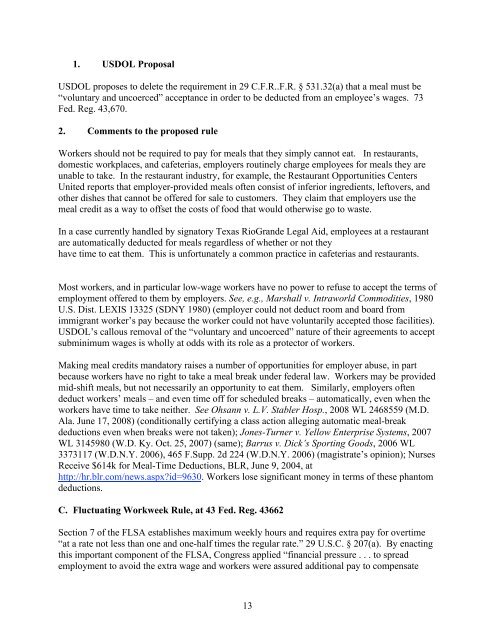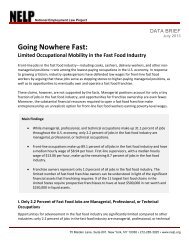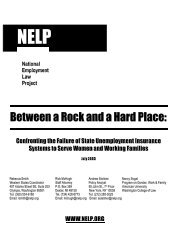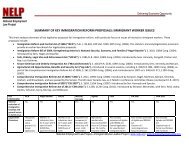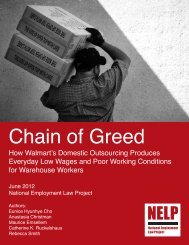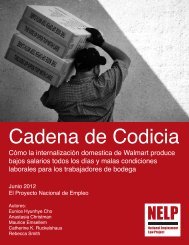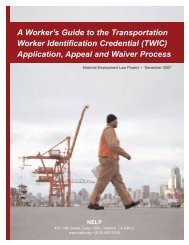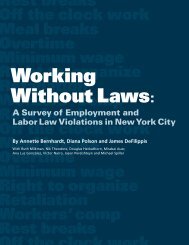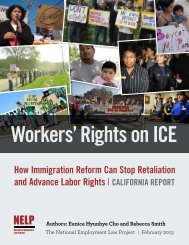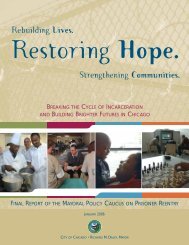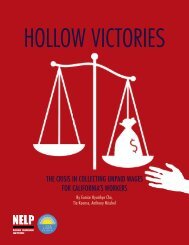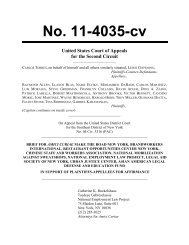National Employment Law Project
National Employment Law Project
National Employment Law Project
You also want an ePaper? Increase the reach of your titles
YUMPU automatically turns print PDFs into web optimized ePapers that Google loves.
1. USDOL Proposal<br />
USDOL proposes to delete the requirement in 29 C.F.R..F.R. § 531.32(a) that a meal must be<br />
“voluntary and uncoerced” acceptance in order to be deducted from an employee’s wages. 73<br />
Fed. Reg. 43,670.<br />
2. Comments to the proposed rule<br />
Workers should not be required to pay for meals that they simply cannot eat. In restaurants,<br />
domestic workplaces, and cafeterias, employers routinely charge employees for meals they are<br />
unable to take. In the restaurant industry, for example, the Restaurant Opportunities Centers<br />
United reports that employer-provided meals often consist of inferior ingredients, leftovers, and<br />
other dishes that cannot be offered for sale to customers. They claim that employers use the<br />
meal credit as a way to offset the costs of food that would otherwise go to waste.<br />
In a case currently handled by signatory Texas RioGrande Legal Aid, employees at a restaurant<br />
are automatically deducted for meals regardless of whether or not they<br />
have time to eat them. This is unfortunately a common practice in cafeterias and restaurants.<br />
Most workers, and in particular low-wage workers have no power to refuse to accept the terms of<br />
employment offered to them by employers. See, e.g., Marshall v. Intraworld Commodities, 1980<br />
U.S. Dist. LEXIS 13325 (SDNY 1980) (employer could not deduct room and board from<br />
immigrant worker’s pay because the worker could not have voluntarily accepted those facilities).<br />
USDOL’s callous removal of the “voluntary and uncoerced” nature of their agreements to accept<br />
subminimum wages is wholly at odds with its role as a protector of workers.<br />
Making meal credits mandatory raises a number of opportunities for employer abuse, in part<br />
because workers have no right to take a meal break under federal law. Workers may be provided<br />
mid-shift meals, but not necessarily an opportunity to eat them. Similarly, employers often<br />
deduct workers’ meals – and even time off for scheduled breaks – automatically, even when the<br />
workers have time to take neither. See Ohsann v. L.V. Stabler Hosp., 2008 WL 2468559 (M.D.<br />
Ala. June 17, 2008) (conditionally certifying a class action alleging automatic meal-break<br />
deductions even when breaks were not taken); Jones-Turner v. Yellow Enterprise Systems, 2007<br />
WL 3145980 (W.D. Ky. Oct. 25, 2007) (same); Barrus v. Dick’s Sporting Goods, 2006 WL<br />
3373117 (W.D.N.Y. 2006), 465 F.Supp. 2d 224 (W.D.N.Y. 2006) (magistrate’s opinion); Nurses<br />
Receive $614k for Meal-Time Deductions, BLR, June 9, 2004, at<br />
http://hr.blr.com/news.aspx?id=9630. Workers lose significant money in terms of these phantom<br />
deductions.<br />
C. Fluctuating Workweek Rule, at 43 Fed. Reg. 43662<br />
Section 7 of the FLSA establishes maximum weekly hours and requires extra pay for overtime<br />
“at a rate not less than one and one-half times the regular rate.” 29 U.S.C. § 207(a). By enacting<br />
this important component of the FLSA, Congress applied “financial pressure . . . to spread<br />
employment to avoid the extra wage and workers were assured additional pay to compensate<br />
13


